|
|
|
Sort Order |
|
|
|
Items / Page
|
|
|
|
|
|
|
| Srl | Item |
| 1 |
ID:
171297
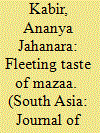

|
|
|
|
|
| Summary/Abstract |
Through a methodology that I term ‘embodied philology’, I trace a genealogy of mazaa as an understanding of enjoyment calibrated through the indices of taste and time. Using this genealogy to mark out an ‘alegropolitics’, or a politics of happiness, I extract its political potential in two ways: first, by assessing it through scholarship on the archive, repertoire, and what Spanish calls sabor, and, second, by applying these ideas, gleaned largely through scholarship from Latin America, to the assessment of Bollywood’s masala repertoire and film star Govinda’s role therein. Govinda’s subscription to a Bhojpuri performativity leads me to relocate mazaa within a decolonising agenda for pleasure formed through transnational and cross-border communities united by an embodied memory of collective enjoyment. A vignette from the 2018–19 Kochi-Muziris Biennale allows me to demonstrate how such memory may be activated to transform the present.
|
|
|
|
|
|
|
|
|
|
|
|
|
|
|
|
| 2 |
ID:
104001
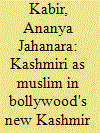

|
|
|
|
|
| Publication |
2010.
|
| Summary/Abstract |
This article examines the depiction of the Kashmiri protagonist in three popular Indian films, Roja (1992), Mission Kashmir (2000), and … Yahaan (2005), in order to argue for a new emphasis, cumulatively evident through these films, on the Kashmiri as Muslim in the history of Bollywood's long engagement with the Valley of Kashmir. In analysing closely the visual, narrative, cinematic and affective aspects of this development, and in contextualising it against global and local politics of Islam, the article aims to contribute to a better understanding of how Kashmir, and Islam, while topics with separate discursive genealogies within Bollywood, have converged decisively at a certain historical juncture so as to open up new possibilities for the ideological co-optation of the Kashmir conflict, and the place of Muslims in India, by the popular cinematic apparatus.
|
|
|
|
|
|
|
|
|
|
|
|
|
|
|
|
| 3 |
ID:
179920
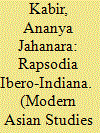

|
|
|
|
|
| Summary/Abstract |
The mando is a secular song-and-dance genre of Goa whose archival attestations began in the 1860s. It is still danced today, in staged rather than social settings. Its lyrics are in Konkani, their musical accompaniment combine European and local instruments, and its dancing follows the principles of the nineteenth-century European group dances known as quadrilles, which proliferated in extra-European settings to yield various creolized forms. Using theories of creolization, archival and field research in Goa, and an understanding of quadrille dancing as a social and memorial act, this article presents the mando as a peninsular, Indic, creolized quadrille. It thus offers the first systematic examination of the mando as a nineteenth-century social dance created through processes of creolization that linked the cultural worlds of the Indian and Atlantic Oceans—a manifestation of what early twentieth-century Goan composer Carlos Eugénio Ferreira called a ‘rapsodia Ibero-Indiana’ (‘Ibero-Indian rhapsody’). I investigate the mando's kinetic, performative, musical, and linguistic aspects, its emergence from a creolization of mentalités that commenced with the advent of Christianity in Goa, its relationship to other dances in Goa and across the Indian and Atlantic Ocean worlds, as well as the memory of inter-imperial cultural encounters it performs. I thereby argue for a new understanding of Goa through the processes of transoceanic creolization and their reverberation in the postcolonial present. While demonstrating the heuristic benefit of theories of creolization to the study of peninsular Indic culture, I bring those theories to peninsular India to develop further their standard applications.
|
|
|
|
|
|
|
|
|
|
|
|
|
|
|
|
| 4 |
ID:
105304
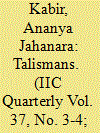

|
|
|
| 5 |
ID:
163822
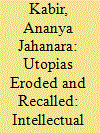

|
|
|
|
|
| Summary/Abstract |
The short-lived geopolitical entity, East Pakistan (1947–71), left a deep impact on its successor state, Bangladesh, through the networks of intellectual kinship it enabled for its young elites who subsequently became Bangladesh’s nation-builders. Drawing on memory studies and literary critical reading methods, I examine the testimonies of nine such elites interviewed by the ‘Bengali Intellectuals Oral History Project’ (BIOHP), alongside their writings published before and after the creation of Bangladesh. This first sustained account of East Pakistan’s intellectual legacy thus also illustrates how a post-colonial intellectual history may be extracted from oral histories as the private and inchoate domain of memory.
|
|
|
|
|
|
|
|
|
|
|
|
|
|
|
|
|
|
|
|
|